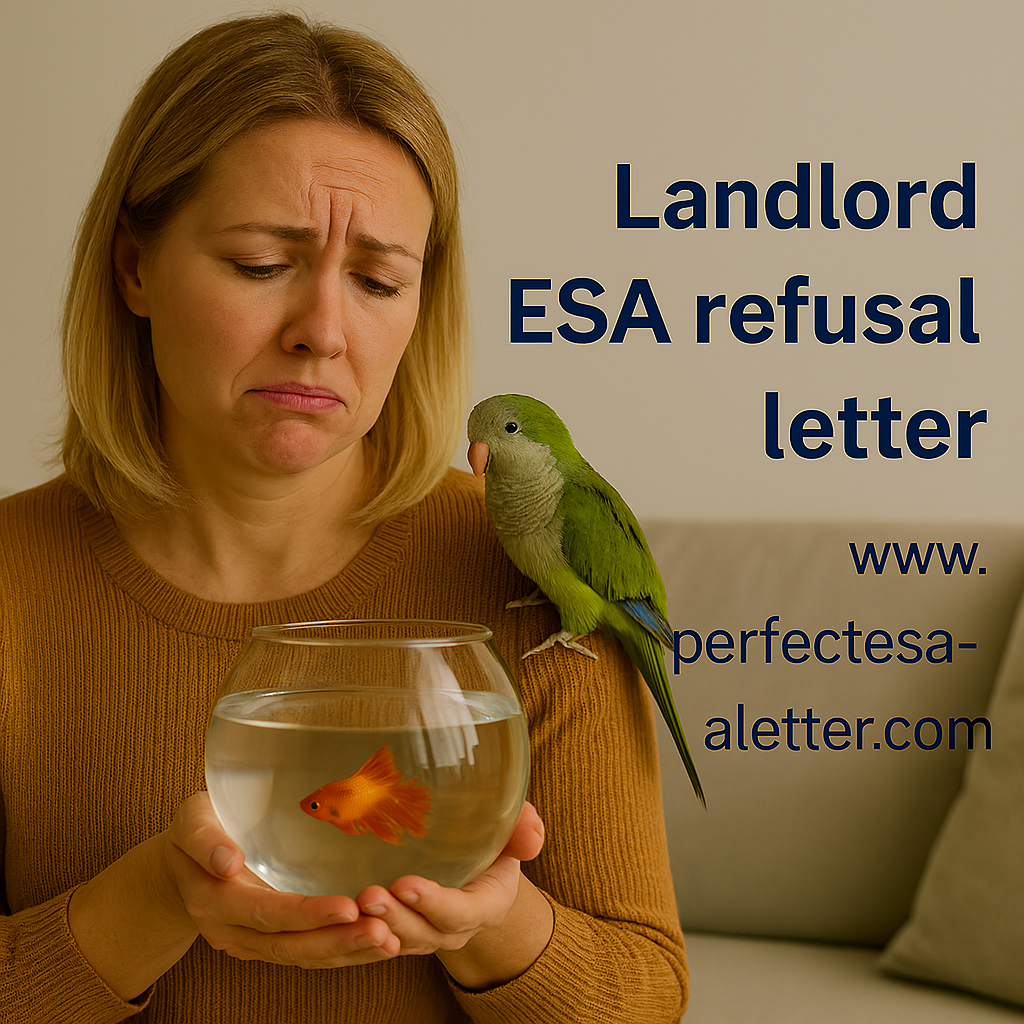Landlord ESA Refusal Letter: What It Is and When It’s Legal
Article
Introduction
When tenants request an Emotional Support Animal (ESA) accommodation, landlords are legally required to provide a response. Sometimes, this comes in the form of an ESA refusal letter—a written notice explaining why the request has been denied.
Not all refusals are legal, however. Some are based on valid grounds under the Fair Housing Act (FHA), while others are outright discrimination. Understanding the difference is essential for protecting your rights as a tenant.
This article breaks down what a landlord ESA refusal letter is, what it should contain, when it’s valid, and how tenants should respond.
”Get Yours Now!
Don’t wait until a landlord or airline tells you “no pets allowed.” Protect your rights today.
Please fill out this form and our team wil contact you ASAP.
Complete your assessment in minutes , get approved by a licensed professional, and receive your letter within 24 hours.
What is a Landlord ESA Refusal Letter?
An ESA refusal letter is a formal written notice from a landlord stating that they are denying a tenant’s request to keep an emotional support animal in their housing unit.
It typically includes:
- A statement of denial
- Reasons for the refusal
- References to housing policies or FHA rules (sometimes incorrectly cited)
- Information on next steps (rarely provided)
When Can a Landlord Legally Refuse an ESA?
The Fair Housing Act requires landlords to make reasonable accommodations for tenants with ESAs. However, refusal may be legal if:
- Undue Financial or Administrative Burden
- If accommodating the ESA would cause extreme costs or difficulties for the housing provider.
- Direct Threat to Health or Safety
- If the ESA has shown aggressive or dangerous behavior that poses a risk to others.
- Significant Property Damage
- If the ESA causes repeated, substantial destruction of property that cannot be reasonably prevented.
- Invalid or Fraudulent Documentation
- If the ESA letter is not from a licensed healthcare professional, is expired, or is fake.
- Exempt Housing Situations
- Some housing types (e.g., owner-occupied buildings with four or fewer units) may be exempt from FHA rules.
Examples of Illegal ESA Refusal Letters
Here are some refusal letter justifications that do not hold up under the law:
- “No pets are allowed in this building.”
- “We don’t allow dogs over 25 pounds.”
- “We charge a $300 pet deposit for all animals.”
- “Your neighbors don’t want animals here.”
- “We don’t allow pit bulls or restricted breeds.”
👉 All of these are invalid grounds for denial under the FHA.
What Should a Proper ESA Refusal Letter Include?
If a landlord is issuing a refusal, the letter should contain:
- Clear Statement of Denial
- Example: “Your request for ESA accommodation has been denied.”
- Specific Legal Reason
- Must cite one of the valid grounds (e.g., undue burden, direct threat, etc.).
- Evidence or Documentation
- For example, prior complaints, safety reports, or property damage records.
- Tenant’s Right to Appeal or File Complaint
- While not always included, tenants have the right to challenge the refusal with HUD.
How Tenants Should Respond to an ESA Refusal Letter
- Review the Reason for Denial
- Determine whether it’s legally valid or just an excuse.
- Check Your ESA Letter
- Ensure it’s from a licensed professional, current, and properly written.
- Request Written Justification
- If unclear, ask the landlord to clarify the reason for refusal.
- Negotiate Calmly
- Sometimes, disputes can be resolved through communication and compromise.
- File a HUD Complaint
- If you believe the refusal is discriminatory, you can file a complaint with the U.S. Department of Housing and Urban Development (HUD).
- Seek Legal Assistance
- Tenant rights attorneys or local fair housing organizations can represent you.
Real-Life Example of an ESA Refusal
- A tenant submitted a valid ESA letter for her emotional support cat.
- The landlord refused, citing a “no-pets” policy and demanding a $500 deposit.
- The tenant filed a HUD complaint.
- HUD ruled in her favor, requiring the landlord to approve the ESA and refund fees.
👉 Lesson: ESA refusal letters based on pet policies or deposits are discriminatory and illegal.
FAQs
Q1: Can a landlord refuse my ESA if they just don’t like animals?
👉 No. Personal preference or building policies are not valid reasons.
Q2: Do landlords have to provide a refusal letter in writing?
👉 Yes. Verbal denials are insufficient; written notice is standard practice.
Q3: Can I still live in the unit if my ESA is refused?
👉 Yes, but you should challenge the decision if the denial is discriminatory.
Q4: How long does a landlord have to respond to my ESA request?
👉 There’s no set federal timeline, but landlords must respond promptly and reasonably.
Q5: Can I sue my landlord for refusing my ESA?
👉 Yes. If HUD confirms discrimination, you may pursue legal remedies, including damages.
Conclusion
A landlord ESA refusal letter can either be a legitimate denial or a clear act of housing discrimination. Knowing the valid reasons versus illegal excuses helps tenants protect their rights and take proper action.
If you receive such a letter:
- Review the legal grounds carefully.
- Ensure your documentation is valid.
- Don’t hesitate to file a complaint if your rights are violated.
With the protections of the Fair Housing Act, tenants can fight back against wrongful ESA refusals and ensure equal access to safe, supportive housing.
”Get Yours Now!
Don’t wait until a landlord or airline tells you “no pets allowed.” Protect your rights today.
Please fill out this form and our team wil contact you ASAP.
Complete your assessment in minutes , get approved by a licensed professional, and receive your letter within 24 hours.

